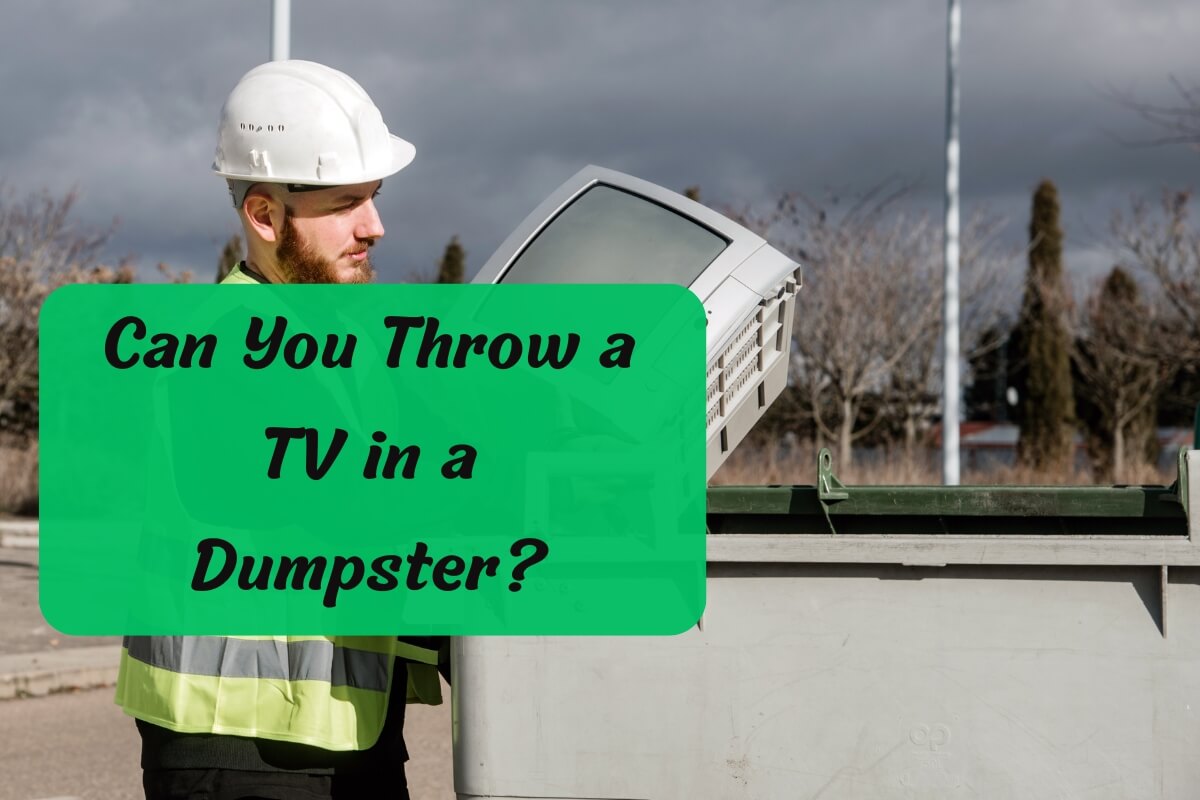
When it’s time to upgrade or discard an old television, you might wonder, “Can I just throw my TV in the dumpster?” The short answer is no, you should not throw a TV in a regular dumpster. This blog post will explain why disposing of TVs requires special handling and provide better alternatives for getting rid of your old TV responsibly.
We’ll cover:
- Why TVs can’t go in standard dumpsters
- Hazardous materials found in TVs
- How to properly dispose of or recycle an old TV
- Penalties for illegally dumping TVs
- Preparing a TV for recycling or disposal
- Options for recycling other electronics
Why You Can’t Just Toss Your Old TV in the Trash?
While it might seem convenient to simply throw your outdated television into the dumpster, old TVs actually contain several hazardous materials that are dangerous for the environment if not disposed of properly.
Some of the toxic components commonly found in TVs include:
Lead: Older CRT (cathode ray tube) TVs used lead to protect consumers from radiation. Even newer flat-screen TVs contain lead in the glass panels.
Mercury: Many flat-screen LCD TVs use mercury lamps as light sources. Mercury is an extremely toxic heavy metal.
Flame Retardants: To meet fire safety standards, TVs use flame retardant chemicals that can release toxic gases when burned or deteriorate over time.
When TVs end up in landfills, the lead, mercury, and other hazardous substances can potentially leak into the soil and groundwater over time. This contamination poses serious risks to the environment and human health.
That’s why most areas prohibit disposing of TVs and other electronic waste (e-waste) in regular household trash or dumpsters. Special e-waste recycling programs are required to handle TVs safely.
The Best Ways to Dispose of an Old TV
So if you can’t throw a TV in the dumpster, what are your options? Here are some recommended methods for responsibly getting rid of an old or broken television set:
Take It to an E-Waste Recycler
Your best option is to locate an e-waste recycling facility or event in your area. These recyclers are equipped to safely remove the hazardous components from TVs and either dispose of them properly or recover valuable materials for reuse.
Many municipalities offer e-waste collection days or permanent drop-off locations for residents to recycle TVs and other electronics for free or a small fee. Contact your local waste management authority to ask about e-waste recycling programs near you.
Use a Manufacturer Recycling Program
Several major TV brands like Samsung, LG, and Sony offer recycling programs that allow you to mail back your old TV for proper disposal, sometimes at no cost. Check the manufacturer’s website for their television recycling options and instructions.
Look for Retailer Trade-In or Recycling
When purchasing a new TV from retailers like Best Buy or Conn’s, inquire about trade-in programs that allow you to turn in your old set for recycling. Some retailers even offer discounts or credits for recycling your old television this way.
Many retailers also have permanent e-waste drop-off bins in their stores for customers to recycle old electronics like TVs for free.
Hire a Junk Removal Service
If you don’t have a vehicle to transport your old TV, you can hire an e-waste certified junk removal company to pick it up from your home. They will ensure it gets properly recycled, but expect to pay a fee for this convenience.
No matter which option you choose, recycling TVs through approved programs is vastly better for the environment than sending them to landfills.
Finding a Local E-Waste Recycler Near You
To find a convenient e-waste drop-off site or recycling event for your old TV, start by checking resources from:
- Your city, county or state’s waste management/recycling department website
- Non-profit recycling organizations like Call2Recycle or Earth911
- The Environmental Protection Agency’s e-cycler locator
These sources can provide lists of certified e-waste recycling centers and upcoming collection events in your local area, often searchable by zip code.
When choosing an e-waste recycler, look for facilities that are e-Steward or R2 certified. These meet high environmental standards for safely handling and recycling electronics.
Can You Ever Put a TV in a Dumpster? Potential Fees and Penalties
Some areas allow putting TVs in standard trash or construction dumpsters under special circumstances, but most areas completely prohibit it:
Some waste management companies offer e-waste dumpster rentals specifically for disposing of TVs and other electronics. However, they will charge an additional “e-waste fee” to offset the costs of properly recycling these hazardous materials.
For example, residential dumpster rental companies like Budget Dumpster and Bin There Dump That offer e-waste dumpsters in select areas for an extra per-item fee (usually $25-$50 per TV). The TVs are then transported to certified e-waste recyclers.
Similarly, certain landfills and transfer stations may accept TVs for disposal, but charge a per-unit fee to cover their own e-waste recycling costs.
So in certain areas, you technically can throw a TV in a dumpster or take it to a designated disposal site, but you’ll have to pay extra fees. These e-waste disposal fees help create an incentive for people to utilize free recycling options when possible.
Penalties for Illegally Dumping TVs
In most places, throwing away a TV improperly by putting it in a standard trash dumpster or dumping it illegally is considered unlawful disposal of hazardous waste.
The penalties vary depending on your area, but can include stiff fines ranging from $100 up to $25,000 per violation. Illegal dumping can also potentially lead to jail time for repeated serious offenses in some states.
Additionally, if environmental contamination occurs from the improper disposal, you may be held liable for the costly cleanup efforts required to remediate the pollution.
Given the strict regulations and hefty potential penalties involved, it’s simply never worth the risk to illegally dump a TV in a dumpster or landfill. Utilize proper e-waste recycling channels instead.
How to Properly Prepare a TV for Recycling or Disposal
If you plan to recycle or legally dispose of your TV through approved programs, take some simple steps first to prepare the television:
Remove Any Detachable Components
Cords, cable boxes, game system connections, and TV stand components should all be detached and separated out. Many of these accessories can be recycled separately or disposed of more easily.
Package It Carefully
When transporting the actual TV unit, protect it from breaking by securing it with packing materials in a box or covering it with a tarp in your vehicle. Broken shards can release toxic dust.
Wipe Personal Data from Smart TVs
Before recycling a Smart TV, erase personal data, reset to factory settings, and remove external storage devices to protect your privacy.
Don’t Try to Disassemble TVs Yourself
Remove easy-to-detach parts from a TV, but never try to take it apart yourself unless you’re a trained professional, as it contains hazardous materials.
Other E-Waste That Requires Proper Disposal
TVs certainly aren’t the only electronic products containing hazardous components that require special handling for disposal. When upgrading your home electronics, be aware of other e-waste items that need to be recycled:
Computers: Both desktop and laptop computers contain metals, batteries, and other hazardous materials.
Monitors: Like TVs, computer monitors have mercury lamps that must be properly handled.
Printers: Laser printers use toner with chemicals like selenium.
Mobile Devices: Smartphones, tablets, and e-readers have lithium-based batteries that require recycling.
Game Consoles: Video game systems have hazardous components like circuit boards and batteries.
Household Batteries: Rechargeable batteries like lithium-ion, nickel-metal hydride should be recycled.
Check with your municipal recycling program about any special collection days, locations or procedures required for disposing of these other common household electronics responsibly.
The Environmental Benefits of Recycling E-Waste
Taking the extra steps to properly recycle TVs and other electronic waste may require some extra effort, but delivers huge environmental benefits, including:
Reducing Pollution and Contamination
Keeping e-waste out of landfills prevents the release of toxic heavy metals, chemicals and air pollution from dismantling facilities with poor environmental standards.
Conserving Raw Materials
Many components in electronics contain valuable raw materials like precious metals that require extensive mining to obtain. Recycling e-waste helps recover these finite resources like gold, silver, copper and palladium so they can be reused in manufacturing new products. This reduces the environmental impact and greenhouse gas emissions associated with raw mineral extraction.
Supporting a Circular Economy
Rather than following the traditional take-make-waste linear approach, responsibly recycling electronics promotes a circular economy that reuses materials over and over in a sustainable loop. This cyclical model helps conserve energy and natural resources in the long run.
Creating Green Jobs
The booming e-waste recycling industry has fueled the creation of many new green jobs and businesses focused on safely refurbishing, repairing, reselling or recycling used electronics. This stimulates local economies while diverting e-waste from landfills.
Regulatory Compliance
Properly recycling e-waste ensures companies and individuals remain compliant with all federal, state and local regulations around hazardous waste disposal. This helps avoid any environmental violations or penalties.
By taking advantage of e-waste recycling programs, you’re doing your part to promote a cleaner, healthier planet for future generations. Every TV, computer or other electronic device recycled responsibly makes a positive impact.
Conclusion
While tossing an old TV in the trash may seem like the easiest disposal option, it’s actually illegal in most areas due to the hazardous materials TVs contain. Following proper e-waste recycling procedures is crucial to prevent environmental contamination from those toxic components.
Fortunately, there are many convenient ways to recycle or legally dispose of your outdated televisions through manufacturer mail-back programs, retailer trade-in events, municipal collection sites and e-waste recyclers. A little extra effort is a small price for reducing pollution, conserving resources and supporting a more sustainable circular economy.
So the next time you go to upgrade your home entertainment center, make the responsible choice – don’t throw that old TV in a dumpster. Utilize an approved e-waste recycling solution to dispose of it safely. Your actions today help create a greener tomorrow.






